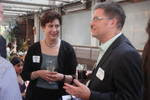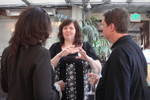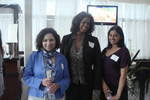
Ms. Edith Whitfield Seashore and Dr. Michael Broom are presenting a BAODN workshop on Sept. 23rd called “Becoming a Change Agent”. The following post merges separate interviews with Edie and Michael about their upcoming workshop, the two key disciplines they are focusing on, and the state of OD today.
Edie and Michael are a multicultural team who have worked together for many years. Both are psychologists and seasoned change management professionals who have worked both internally and externally and are well known and published in the field.
In your upcoming workshop, you’re focusing on the disciplines of conscious-use-of-self and infinite power? Why did you choose these two?
Michael: We want to give the audience a strong dose of two of our eight disciplines critical to any OD practitioner. Both Edie Seashore and I have taught at Hopkins, Georgetown, McGill, plus more. Graduates are struggling to apply what they learned. Academia is based on knowledge, but how to apply that knowledge? We focus on the ‘conscious use of self’ -- that's where change in any system starts. If I cannot manage myself effectively it's going to be difficult to support you in you managing yourself effectively, so that you can manage the changes in your organization.
Edie: The whole premise on which our program is based is the conscious use of self, so that's obvious why we would choose that one. We think that everything that any of us do would be enhanced by our being more aware and conscious of how we choose to lead ourselves. So that’s a baseline.
Michael: We go through life mostly on automatic, and most of the time automatic works just fine. We get up out of bed a certain way, brush my teeth a certain way, cook my dinner a certain way---I don't have to think about it. But if we really want to manage change and not have things be the same as they have been then we really need to be aware of when we have slipped into automatic and get ourselves off of automatic so that we can behave, think, feel and have beliefs that support all that.
Edie: A discipline is [something] that you are deliberately trying to put into practice and that takes a lot of conscious use of self to do so. A lot of [the disciplines] are counter-cultural -- they aren't the way we usually operate. For instance, on the use of self, our tendency is very often to be on automatic or to blame others for what's going on instead of taking it upon ourselves to think about what choices can we make, and being accountable in every respect, even when things aren't going well. What can we do that will make a difference and try to be accountable to that rather than just going on automatic and blaming or feeling upset. That takes discipline to do that.
What is infinite power?
Edie: So automatically we go to a win/lose because that is what we have been socialized to do in this society from the time we're born, even with our own siblings, right? The infinite perspective is that we both be satisfied with the solution. I don't like the phrase win/win but I like the notion that we're both feel equally okay about how it all comes out--that take a discipline to keep playing the game long enough for that to happen, without succumbing to a win/lose. That's a big discipline.
An example: I was watching a group try to decide how to change a weekend workshop. The reason they had to change the date--there was about 25 of them involved--is because one of the faculty had misunderstood a date and couldn't do it that day. They kept trying to find out when everybody could come to another weekend, and they kept going further and further out and they were not [able to find a date] and finally one guy said "Look, this is just ridiculous. I can't change a weekend that most of you could come because it's my wedding date. However, I don't mind missing that weekend. So go ahead and do it.” And just before they decided to go ahead -- they were so relieved -- one woman said, “Let's try for one second and go further in instead of going further out.” She proposed another weekend closer and everybody could do it. And they all said "Wow." She said, “I just wasn't going to settle for him not being able to be there. So I tried one more shot at it." So the question is--can we keep the game playing for one more shot at it so everybody's ok with what the solution is? Given the pace of things in our society these days, people stop short of that. Because it does take time.
The person who suggested this was a woman. She felt very powerful when she came up with this crazy weekend that everybody could do. And all she had done was just not give up on the game. But she was very powerful, everybody was very grateful, and so it worked out.
Michael: We live in a world where most of us are on automatic and see that power is scarce. If I'm going to get my way you can't get yours. It's dog eat dog and we're either going to compete with each other or somebody is going to conform because they don't want to look like they're not playing ball. Nobody wants to be called "you're a loser" nobody wants to hear that you're not a team player. Rather than risk that kind of win/lose situation we turn ourselves into victims and go along to get along. That really trashes our own sense of self, and second it really doesn't help us get to the next discipline which is ‘learning from differences.’
When we're playing win/lose power dynamics, what we use to determine who's going to win and who's going to lose are differences. That's really important to get. Well I'm a male and you're a female and both the culture you're raised in, men win over women...and if there was a white person present both of us would lose at least in this society because of that difference. There's just many mundane differences where we've already been programmed around who's going to lose and who's going to win; such as first and second, which wins? Top/bottom which wins? Fast/slow which wins? We're already been programmed to think about that without even knowing well, fast what? More what? Now when we're using differences to determine who wins and who loses, differences become dangerous, so that I'm either going to fight about my thought that's different than yours or I'm just going to just cave and pretend that I agree.
Unless we can switch out power paradigms over to one that is much more open...which we call ‘infinite power’ where the point of the game is to keep the game going. Because if we're going to play win/lose we don’t really know who's going to win and who's going to lose until the end of the game. The point of the infinite game is "Can we keep this game going?" That means we got to take care of all the players because if any players gets hurt or gets dissatisfied, the game is in danger of ending. Something really fascinating happens there...differences are no longer dangerous. Their inherent value can then come out and the inherent value of differences is that they are the only learning that we have.
You could put in me in a room with 25 clones of Michael Broom and I already know everything that they know. But I can learn from you. I can learn from anybody because you're different than me, if I've got my learning cap on. Now Peter Senge talks about the learning organizations but Peter doesn't talk about that we can't become a learning organization unless we can switch this power dynamic away from win/lose to something much more open.
Edie: Very often the win/lose ends up taking more time because those who didn't win are trying to to figure out a way for them to get what they had in mind. They're fighting for that, so it isn't exactly always a time-saver. The question would be--is this an issue that is important enough for us to stay with? And keep working on it, so that we can actually all feel good about it?
I think incidentally women, the notion of a power is something that could be an intriguing conversation. As woman who grew up during the women's movement I was very involved in all of that. I think women are enormously powerful and the socialization was that we shouldn't be seen or heard and I think there was a reason for that....because we turn out to be quite powerful.
Women would be more inclined to be excited about [infinite power] as we like relationships, we like to collaborate, and this has a lot of that quality to it and it also turns out to be very powerful.
What would experienced practitioners learn from your workshop?
Edie: Well most of them haven't given much thought to the kinds of things we talk about interestingly enough. We put the workshop together for experienced people. We were very astonished that ‘conscious use of self’ was not part of their repertoire. They didn't realize how enormously impactful they as human beings were being in the system and how they could help other to recognize that.
Even the people who put the wonderful models together are not necessarily caught up in how people in the system can use themselves consciously to make a better impact. The relationship between their intention and their impact is not very clear in many cases. People go into meetings and say, “There was no reason for me to be there and it was a waste of my time.” Well why would they say that if they were using themselves effectively? I think they just didn’t bring this to their consciousness. I think that we have been more impactful on the experienced people than we have been on new people. The experienced people know what they haven't been doing.
What is the state of OD today? Is it still relevant? How is it still relevant?
Michael: It's a very important question for several reasons and is one of the reasons why I got myself onto the Board of the OD network. We don't have a standard definition of what OD is. If you look in the literature then you see all the definitions, they're all kind of vague. They kind of point us in a certain direction but the really don't say what is it we do. So we've come up with a more concrete definition which goes like this:
"We collaborate with organizational leaders and their groups towards systemic change and root cause problem solving on behalf of greater productivity and increased employee satisfaction through strengthening the human processes through which they get their work done."
I think that OD is more relevant than it has been because the bulk of our issues in human systems deal with differences, and if we go back to learning from differences and the infinite power aspect and being able to use ourselves consciously, then we become much more productive, much more satisfied. Life becomes much more meaningful and many of the issues that we find not only in the workplace but at home, and in the world will just go away because essentially OD is really about fundamental life skills about how to make human systems work.
Edie: If it can go into many different parts of the organization--I don't think it has to reside in the consultant or in a position--I think the principles of OD being incorporated into the system would be fantastic. I think that every leader should be an OD practitioner, that's how relevant it is. I think it's extraordinarily relevant. But not as a discipline necessarily, but as a concept that everybody could share.
I don't think we [the OD consultants] should be the sole consumers of OD. We should be in a position to pass the principles and disciplines and concepts of OD into the system so that other people can make sense out of them and use them.
Michael: The educational process for OD practitioners is misplaced. The OD skills really belong with leaders, not necessarily with the other layer called OD practitioners. The leaders actually need these skills on a day-to-day basis. OD should be embedded in the rubic of leadership development.
Want more? Come meet Michael and Edie in person on Thursday September 23rd. For registration and details please go to www.baodn.org
Want more? Come meet Michael and Edie in person on Thursday September 23rd. For registration and details please go to www.baodn.org
 Rani H. Gill is a learning designer looking at ways to help people learn and organizations change. She speaks, manages, and designs in three languages: technology, education and business. You can find her at her blog (wanderatwill.com), twitter, or Linked-In. She currently consults with organizations interested in using learning methodologies to change their organizations. Rani is also a Speaker Series volunteer with BAodn.
Rani H. Gill is a learning designer looking at ways to help people learn and organizations change. She speaks, manages, and designs in three languages: technology, education and business. You can find her at her blog (wanderatwill.com), twitter, or Linked-In. She currently consults with organizations interested in using learning methodologies to change their organizations. Rani is also a Speaker Series volunteer with BAodn.














.jpg)


